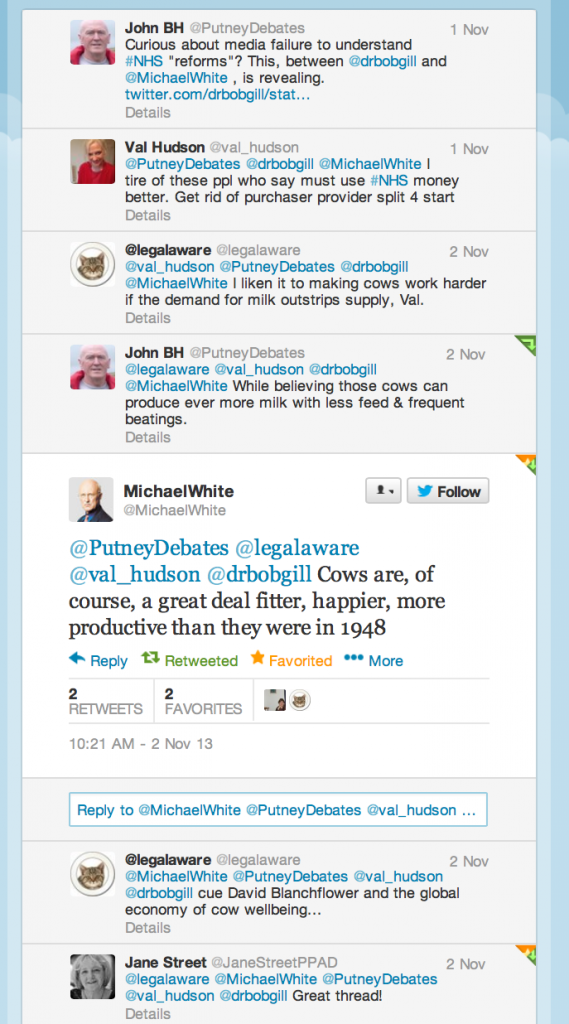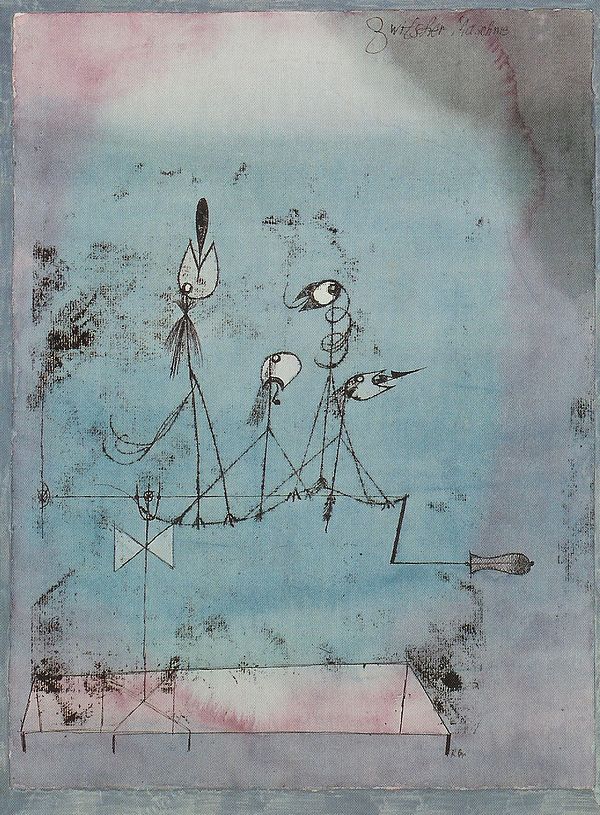Just before I got in a black cab to go to my slot for a viewing of Paul Klee’s amazing paintings at the Tate Modern, I was finishing a Twitter conversation which included Michael White (@MichaelWhite) from the Guardian.
I posted an article on ‘mega dairies‘ on my Facebook. Various approaches to reconfigurations of the NHS had been on my mind. The rôle of the district general hospital had come under scrutiny. Some people think that it might be better to produce “super hospitals”, but my experience from my friends is that they would rather go to a local hospital if they had an acute medical emergency such as acute severe asthma.
This analogy with milk production has no limits for me. I am particularly sick of the ‘we cannot afford the NHS’ argument, although I am very familiar with the ‘funding gap’ arguments from the usual suspects. I think of the ‘more from less’ argument in my analogy as making existing cows produce milk harder. As for the supply of milk? I can buy a carton of milk either from my local corner shop, or I can drive to a huge out-of-town supermarket a few miles away. It’s the same carton of milk.
The moronic economic arguments keep on coming, totally blasting out-of-the-water what the patient or person actually wants. The mantra of ‘no decision about me without me’ has become totally ludicrous when you think that the Lewisham campaign had to take the Secretary of State for Health to court, not only in the High Court but also in the Court of Appeal. If Jeremy Hunt feels the need to appeal the decision at the Court of Appeal in the Supreme Court, I’ll be tempted to emigrate.
I won’t reproduce the entire conversation – but here’s some of it.
You can trace it back to Twitter here.
(Click here to see the thread better.)
And I had an added ‘bonus’ when I turned up at the Tate Modern finally. It dawned on me that, despite the change towards National Socialism that Germany was undergoing for much of Klee’s life, Klee to me looked and sounded like a socialist. I feel socialism is like pornography: you recognise it when you see it. Klee had a close friend called Franz Lotmar, and it turned out that Lotmar introduced Klee to socialism. I was first introduced to socialism by Martin Rathfelder, in contrast. And apparently Oscar Wilde’s “The soul of man under socialism” impressed Klee so much that he gave a detailed summary (and added his thoughts) to another friend called Lily.
The first painting I came to was “The Twittering Machine” (Die Zwitscher-Maschine) – a 1922 watercolour and pen and ink oil transfer on paper. Like other artworks by Klee, it blends biology and machinery, depicting a loosely sketched group of birds on a wire or branch connected to a hand-crank.
Ironically both ‘biology’ (the ageing population) and ‘machinery’ (technology) are being blamed for the demands on the NHS budget in the future, which lead some people to conclude erroneously that the NHS is not sustainable (assuming that you refuse to contemplate methods of funding the NHS properly.) Ed Balls this morning again revisited the narrative of ‘public good, private bad’, advancing as ever Labour’s commitment to “PPPs”, viz public-private partnerships. This of course has been a totemic strand in the NHS policy from both the Conservatives and Labour, examples being the independent sector treatment centres, private finance initiative, and, of course most recently, the Health and Social Care Act (2012). It’s so easy to go with the flow of the associations of the words ‘private’ and ‘public’ that one can loose sight altogether of the actual meanings of the word ‘private’ and ‘public’. For example, thinking about what ‘private’ means, it should be no surprise that private limited companies wish to hide behind the corporate veil in refusing freedom-of-information requests?
In 1941 (the year after Klee died), the celebrated art critic Walter Greenberg called attention to the “privateness” of Klee’s work. It had some reminiscences of a scathing review published in the 1920s in the Dusseldorf Review which likened Klee’s “private work” to “pig Latin” which was ‘unfit for public consumption’. Indeed, walking around the twenty or so rooms of the Klee exhibition, you can really notice the change of style from a ‘completely personal’ style of illustration, more fitting perhaps for the decoration of picture books, to a more public style of display, more fitting perhaps for decoration of whole walls.
One of Klee’s more famous sayings is, “One is always in good company when one has no more money.” Possibly Klee was predicting the political pain of Liam Byrne’s oft-quoted ‘there’s no money left’ note with Labour losing the 2010 general election? However, a narrative in Klee’s art appears to parallel his imputed journey in political philosophy, for example in his attitudes towards ‘collectivism’.
Living with austerity is something which the NHS is trying to do, but it is still very striking how the shift in English health policy is taking place towards value-based outcomes rather than activity per se, mirroring a change in emphasis in US corporate management. Life after the global financial crash in 2o08, not unilaterally caused by Gordon Brown, has also seen a change in emphasis from output as measured by GDP to wellbeing. The concept of a ‘happy peasant’, a peasant who is extremely poor but more contented than an investment banker with a high income, has emerged in recent years in the wellbeing research. Klee’s exhibition at the Museum of Modern Art in New York had as its canvas the Wall Street Crash of October 1929. In the spring of 1930 Klee commented, “What do I prefer? international renown, without a penny; or the well-being of a wealthy local painter?’
Klee once remarked that, instead of taking part in the discussions between competing schools of the Bauhaus, he would sit back and watch both sets of academics fight it out between them. It is tempting for English health policy commentators to sit back and watch the political philosophies of socialism and neoliberalism fight it out for the soul of the NHS.
Unfortunately, this is a fight which there doesn’t seem resolution for in the near future. Even with Andy Burnham’s promise of the ‘NHS preferred provider’, there’s still a market, and there’s still a need for regulation. Possibly Burnham can get rid of the competitive elements with a final thrust towards ‘whole person care’. However, ‘whole person care’ may be a polite way of saying the ‘integrated share model’, and, with prime contractor models lasting at least ten years, Burnham and Miliband’s Labour might find this all remarkably difficult to unwind.
Paul Klee escaped to Switzerland from National Socialism.
Where Labour flees to from section 75 and associated regulations is anyone’s guess. Nonetheless, Burnham and Labour have been emphatic about repealing the Health and Social Care Act (2012).
It’s the necessary start, nonetheless.
“The EY Exhibition: Paul Klee – making visible” runs at the Tate Modern, near Blackfriars, London SE1 between 16 October 2013 and 9 March 2014. For further details, please go here.



